Eva Bartok | home 
BIOGRAPHY Page 3
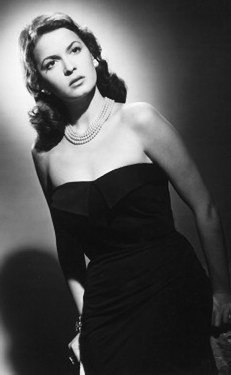 At last ....a movie star!
|
EVA BARTOK: a biography
Copyright 2013 Omar Martinez
Part 7: GOOD LUCK AND DOUBTS
As Eva Bartok evaluated what seemed like a hopeless situation, luck materialized when an Italian stage producer arrived in London looking for an English actress. The man was impressed by all the Bartok publicity and asked her to join his company. "Can she learn enough Italian in three weeks to do the show"? "Of course" was Eva’s prompt reply. Bill was not happy with this turn of events. He was now in love with her and was afraid of losing her if she went to Italy alone. Eva was also very fond of him but she could not let this opportunity pass by. For the first time in a long while she felt alive at the prospect of stage work. She asked permission from Korda and flew to Rome where rehearsals had already began. It was one of those theater "reviews" that included a little of everything: singers, dancers, comedians, magicians, acrobats, novelty acts, etc.
Her part was to do a serious monologue towards the end of the show and she tackled it with all she had. Another positive thing was that Eva was able to bring her mother from France to be with her in Italy during the show's run. They opened on Christmas eve 1951 at the Teatro Manzoni in Milan to great success and proceeded with performances in Florence, Venice, Genoa and other cities before landing in Rome at the famed Teatro Quirino for an extended six-weeks engagement. The whole tour lasted four months and all the traveling was not particularly pleasant. The salary was hardly enough to live on but Eva didn't care about all that. She was working, she had her mother with her and she was happy.
|
Meanwhile in London, "A Tale of Five Cities", the film Eva did with Alexander Paal in 1949, had finally reached the movie houses. Among the people who saw it were director Robert Siodmak and actor-producer Burt Lancaster who were visiting England looking for an actress to play Burt's love interest in the upcoming production of "The Crimson Pirate." Impressed by Eva’s good looks and talent they wired her in Italy. Initially they asked her for a screen test but Eva, certainly tired by now of those fruitless chores, refused and dared to reply "No test. Send script." Surprisingly, she got the part and was asked to report for location shooting at the Island of Ischia, off the coast of Naples. Unfortunately, her mother's visa couldn't be extended and she had to go back to France. Eva arrived in paradisiacal Ischia and had excellent rapport with Burt Lancaster and the rest of the cast and crew. It was hard work but she didn't mind at all knowing that "The Crimson Pirate" would be instrumental in her career, a first rate production that would be seen all over the world. She even had time to enjoy the enchanting beaches all alone and this meant that she had time to think about her life and future.
Right there at the beach, Eva could foresee what lay ahead: financial independence, mansions, furs, jewelry, cars, in short the best of everything. However, somehow these thoughts didn't make her happy. She kept wondering what life was all about and realized she didn't want the trappings of success without answers to all the questions swirling in her mind since she was a little girl in Hungary. She decided to pursue these issues as soon as she was back in England sensing that her fulfillment as a human being was at stake.
|
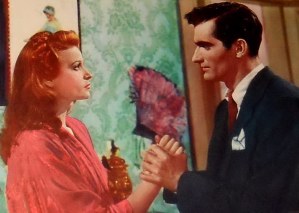 "A Tale of Five Cities" with Bonar Colleano
|
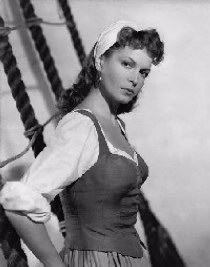 As Consuelo in
"The Crimsom Pirate"
|
Part 8: FAME AND FORTUNE AT WASTELAND
Filming "The Crimson Pirate" took over three months and by the time of her return to London she had spent a year in Italy which did not sit well with Bill. Nevertheless, they were happy to be reunited and before Eva realized what was happening they were talking marriage. The 1952 wedding was reported everywhere as a perfect union. " Movie star and P.R. man" sounded like a team made in heaven and although the couple was happy at the beginning things deteriorated fast.
Eva Bartok was now perceived as a superstar and the new fame brought lots of work and many more commitments. She had to fly back to Italy, this time to Venice, to film the exteriors of the film "Venetian Bird" and as soon as that was finished she had to work on "Spaceways" an early Hammer picture. With all the work and publicity, the newlyweds almost had no time to be together. Still they tried to make the marriage work somehow but soon it became clear to Eva that Bill was not what she needed at that point in her life.
The failure of this marriage was very hard for Bill but it was terrible for Eva. In 1953 she continued making one film after another, and threw herself into everything she disliked becoming a familiar face with the international "jet set" society, attending parties she detested and letting herself be courted by playboy millionaires such as David Michael Mountbatten, the Marquess of Milford Haven.
|
For a while you could hardly open a magazine or a newspaper without seeing the smiling face of Eva holding a glass of champagne in one hand and the Marquess on the other. There were seen everywhere, in Monte Carlo, in Capri, in London. It was the scandal of the day, especially when the Marchioness of Milford Haven filed for divorce and mentioned Eva Bartok as the main culprit in the break up.
Next there was talk that Eva would marry the Marquess any day, a possibility that was not well received by the Royal Family at Buckingham Palace. They shouldn't have worried.
Eva was still very much married to Bill although they filed for divorce that year and Eva considered herself "divorced" at that time. Actually the divorce was not final until March of 1955 and by then, there was a different man in Eva’s life. Later on, looking back on those crazy days of 1953-54, Eva considered them the "most wasted time of her life." She didn't even mention the Marquess in her memoirs although there is evidence that the relationship lasted on and off through 1958.
After months of drifting without really knowing why, Eva rebelled and decided to take control of her life. For her, it was inexplicable that she couldn't behave publicly the way she felt "inside". By this time it was probably too late since the damage to her image was irreversible. She came out of her marriage to Bill and the affair with the Marquess with a reputation for being a frivolous "playgirl" stopping at nothing to have carefree fun among the rich and famous. Ironically, all the publicity had a beneficial effect on her career. Offers for work were pouring in and she starred in film after film thus becoming quite well off financially. She was even offered at this time the classic seven-year contract at Warner Bros. in Hollywood but she managed to decline. Eva had made up her mind to avoid parties and use as much free time as possible reading, meditating and following her quest for understanding and meaning.
|
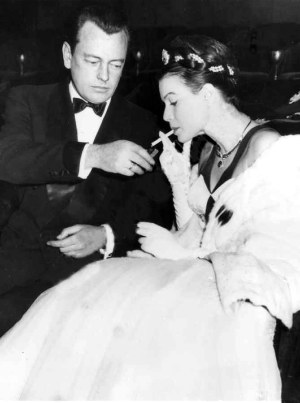 Eva and the Marquess...
|
Things began to turn around for her when she met philosopher-writer J.G. Bennett who headed "The Institute for the Comparative Study of History, Philosophy and the Sciences" at a house named Coombe Springs in Kingston. She started attending meetings, seminars and workshops at the facility and what she was learning was quite enlightening and gave the actress much needed peace of mind. However, her studies were constantly interrupted by professional commitments. Suddenly, she found herself working more and more abroad, specially in West Germany.
It was like an invisible force was pulling her away from the newly found "way" and happiness.
|
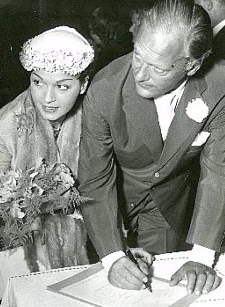 Eva and Curd wed !
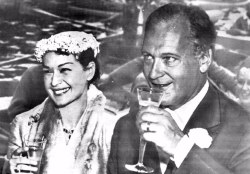 |
Part 9: TRUE LOVE TOO LATE
During the preceding months Eva was granted full citizenship in the United Kingdom thus she was able to bring her mother to England for good. However, not even her mother's presence could bring the stability they both longed for. The mother simply could not recognize her daughter as a world famous entity nor did she approve or understand her lifestyle. It took a long time for Eva to regain her mother's confidence. But again, when things seemed to be normalizing at home, the film contracts required her presence elsewhere.
Eva had done her first German film with actor Curd Jürgens , "Rummelplatz Der Liebe", in 1953 and their on-screen chemistry as a romantic couple was well received by audiences, creating a demand for more Bartok-Jürgens vehicles. These came one after another in rapid succession, "Meines Vaters Pferde", "Der Letzte Waltzer", "Orient Express" and before they realized it, a personal bond had been established. At the beginning it was the comradeship among two professionals; later they found that their sense of humor was very much alike. According to Eva they could "laugh together about the same things" and this quality made their collaborations very pleasant, specially during stressful times. He was fresh out of a failed second marriage and she was still smarting up over the failure of her third.
At the same time, both were trying to cope with the confusion that celebrity had brought into their lives. Slowly, love blossomed between the Viennese born actor and the Hungarian star and when the news exploded there was great rejoicing by fans and media alike. Here were two major movie stars, with controversial pasts, falling for each other in a big way. Sensationalism would haunt Eva and Curd during their whole relationship to the point that their films took second place to their real life antics.
In spite of her previous, tragic, complicated life, it is very possible that Curd was Eva’s first (and last) real love. He adored her and tried to give her the romance she had been lacking in her life. He also tried to live up to their "super-couple" status by buying her expensive gifts, furs, jewelry, even a brand new Cadillac on her 27th birthday, and this is probably the first sign that he did not fully understand the inner reality of his beloved new wife.
|
All of it had arrived too late for Eva who now valued her spiritual progress with J.G. Bennet and his group higher than anything else. Her mistake at this point was to delude herself into thinking that after all the publicity generated by the affair died down she could influence Curd into joining her quest. An unfortunate, widely publicized incident in early 1955 should have served as a warning of things to come. At a hotel in Rome a violent argument broke out between the two stars and Eva ended up spending the night at a local hospital where she was treated for "several minor bruises." However, the couple did what everyone expected. The "super wedding" took place in Schliersee, Germany on August 22nd, 1955 and it was the event of the season with paparazzi, reporters and fans outnumbering the invited guests.
After the ceremony, the famous couple went on to live a fantasy life. He bought for her a beautiful "home among the woods," a chateaux by the Alps like the ones she remembered seeing in storybook illustrations when she was a child. Curd took care that his bride would lack nothing and to make every one of her dreams come true. It was an idyllic existence for the newlyweds until reality set in. The extended honeymoon was interrupted by their many professional commitments. For Eva it was back to England where she combined work with her studies at Coombe Springs. But for Curd, this forced separation was not as easy to take especially when it became obvious that she was not missing him in the same way.
|
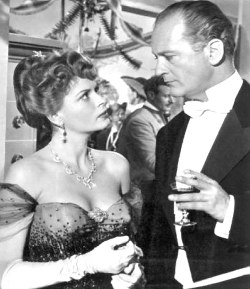 Eva and Curd in "Orient Express"
|
Part 10: HITTING ROCK BOTTOM
As time passed, Eva felt she had to end the marriage to Curd Jürgens. It was not that love had died between them. The love they had for each other was still there, and it was to remain alive for a long while. There was only one thing that separated them: Curd wanted her to give up her faith, "her way of faith." She felt she could not give up something that was not hers to give. "Faith is a gift" -she wrote in her 1959 autobiography- "One has it by the grace of God. And one has no right, no possibility to give it up. I could never explain the real reason I’m leaving him, not to anyone, least of all to him."
In spite of what she wrote there is also the posibility that Eva was turned off by Curd's inability to father a child. In 1933, he had a severe car accident and had to submit to a surgery that removed his spermatic cords resulting in life-long infertility. Eva wanted a child desperately and she wanted a child by the man she loved. It was indeed a hard decision to make and Eva did what she usually did when confronted with heartache. She attended a seminar in Coombe Springs and next immersed herself into her work. This time it helped that for her next film "Ten Thousand Bedrooms," she had to travel to Rome for the exteriors and later to Hollywood for the interiors.
Eva truly enjoyed working with singer Dean Martin and they became fast friends. With this movie came a new possibility for a Hollywood career and she moved into sunny Los Angeles with her mother settling into a beautiful semi-Spanish flat off Sunset Boulevard near the Beverly Hills Hotel. She spent her free time negotiating the distribution in the U.S. of some of her European films and the tricky details of her own studio contract. However, greater challenges awaited her.
After a while in California, Eva began feeling ill. She submitted to a medical examination which revealed an ovarian cancerous tumor which required immediate surgery. Even though doctors assured her that she had excellent chances of survival, something inside her convinced her that she was dying and that no surgery would help. Along with the feelings of doom came an urge to return to London. More than an urge it was like a strong force was driving her there. She chose not to tell anyone, not even her mother, and found an excuse to fly alone to England.
|
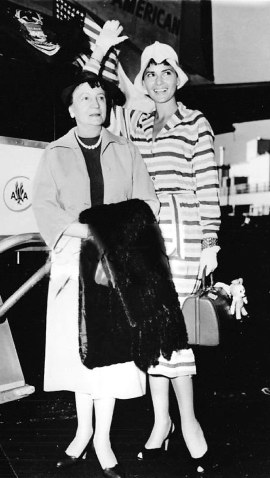 Eva and her mother arrive in Hollywood
|
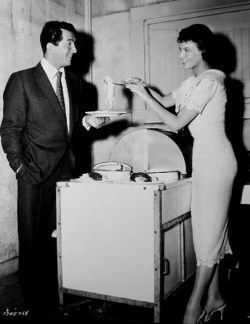 Dean Martin and Eva
|
Back in her beloved London, she wanted first to consult with Mr. Bennett but he was lecturing in Wales. She then went to see some specialists who agreed with the former diagnosis, only that now things were more complicated since they found she was pregnant. An immediate surgery was advised to save her life but there was no hope for the baby. Eva felt that her whole world was collapsing. She felt cheated, dejected and condemned to the ultimate degradation as a woman: she couldn't even bring a child into the world. That which was granted by nature to most members of her sex was being denied to her without mercy. Now she could see that her whole life, in spite of its many worldly achievements, was a total failure.
The days that followed must have been a nightmare for Eva. Her physical condition worsened, she was in pain most of the time and worse of all, she felt spiritually devastated. The doctors urged her to go through the surgery and a date was scheduled at St. Mary’s Hospital in Paddington. On the day before she was supposed to be admitted, J.G. Bennett came to visit her and was shocked to find her in such a frail condition. He listened patiently to Eva’s story and meditated on all the facts. When he finally spoke, his words penetrated the inner core of her being. "There is a meaning to all of this", he said. "This is all happening for a reason and the fact that you felt drawn to come back to England proves it." "You see Eva, you had to come back because someone else is coming here."
|
That was the first time Eva heard about Mohammed Pak Subuh and the Subud movement. "I believe" -proceeded Mr. Bennett- "that he is the one who will carry our work to the next level." Indeed, reports had been pouring in at Coombe Springs about this man from Indonesia who by his sole presence was able to achieve wondrous results in the human condition including healing of body and soul. Could Eva risk waiting for his arrival? After listening to Mr. Bennett, Eva telephoned her physicians and asked them to reschedule surgery for a later time. Their protests could not change her mind and the procedure was postponed for June 10th, 1957. Eva smiled for the first time in many weeks now that a little flicker of hope had been ignited within her. Mr. Bennet, visibly touched, could only mutter: "You are a brave girl, Eva."
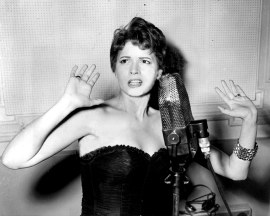 A brave girl...
|
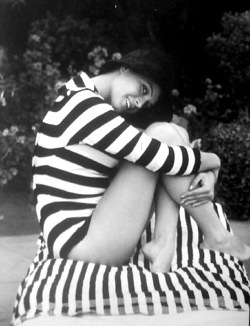 An MGM publicity shot
|

 Back to to
Back to to